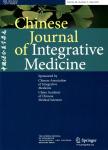Menopause in German and Chinese Women——An Analysis of Symptoms,TCM-diagnosis and Hormone Status
Menopause in German and Chinese Women——An Analysis of Symptoms,TCM-diagnosis and Hormone Status作者机构:University Duisburg-Essen Kliniken Essen-Mitte Knappschafts-Krankenhaus Am Deimelsberg 34 a 45276 Essen Germany Department of Gynaecology Shuguang Hospital Affiliated to Shanghai University of Traditional Chinese Medicine Shanghai (201203) China
出 版 物:《Chinese Journal of Integrative Medicine》 (中国结合医学杂志(英文版))
年 卷 期:2008年第14卷第3期
页 面:194-196页
核心收录:
学科分类:1007[医学-药学(可授医学、理学学位)] 1005[医学-中医学] 100509[医学-中医妇科学] 1002[医学-临床医学] 10[医学]
基 金:the German Academic Exchange Service(Deutscher Akademischer Austauschdienst DAAD No.A/06/00013)
主 题:traditional Chinese medicine yin yang menopause Chinese German Kupperman-lndex testosterone estrogen
摘 要:Objective: To investigate menopause-related symptoms, traditional Chinese Medicine (TCM)-diagnosis and hormone status of two comparable urban samples of menopausal women, one in Essen (Germany) and the other in Shanghai (China). Methods: Patients suffering from menopausesyndrome were recruited from the TCM-outpatient clinic of the University of Duisburg-Essen in Germany (35 subjects) and from the Shuguang Hospital Affiliated to Shanghai University of Traditional Chinese Medicine in China (35 subjects). The Kupperman-lndex for tracing menopausal symptoms was applied. The complete TCM-diagnosis was carried out by the same investigator in China as well as in Germany. Testosterone and estrogen blood samples were collected once from every woman. Results: There were significant differences in specific symptoms of the Kupperman-lndex, such as a higher prevalence of formication and depression in German menopausal women; whereas Chinese menopausal women suffered significantly more from vertigo, headache and paraesthesia symptoms. Concerning TCM- diagnosis, Shen (肾)-yang deficiency was diagnosed in 51.43% of the German women in contrast to 5.71 % of the Chinese women; 17.14 % of the German women were diagnosed as having Shen-yin deficiency compared to 74.29 % of the Chinese women. The German women showed significantly lower mean hormone levels for testosterone compared to the Chinese women (P≤0.0005). Conclusions: German and Chinese menopausal women do not show different prevalence but have different patterns of menopausal symptoms. Furthermore, from a TCM point of view, German women suffer more from Shen-yang deficiency whereas Chinese women suffer more from Shen-yin deficiency syndrome. These results are supported by significantly lower levels of testosterone in German women compared to Chinese women, which, in TCM, is a characteristic of yang deficiency.



